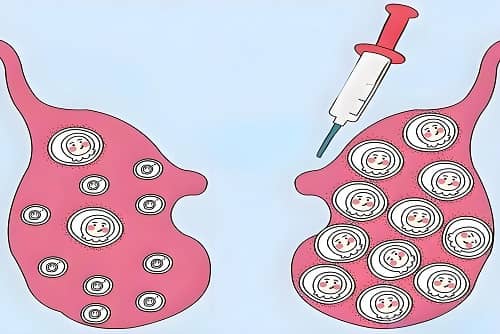Polycystic Ovary Syndrome (PCOS) is a common endocrine disorder affecting many women. It manifests with irregular periods, ovulatory dysfunction, weight gain, hirsutism, acne, and other symptoms, creating challenges for women’s physical and mental health. While treatment varies from person to person, effective management through scientific approaches can alleviate symptoms, regulate hormone levels, and restore menstrual regularity and ovulation function. Below are several common treatment methods:

Table of Contents
- 1. Lifestyle Adjustments: Healthy Diet and Moderate Exercise
- 2. Medication: Regulating Hormones and Promoting Ovulation
- 3. Minimally Invasive Surgery: Improving Ovarian Function
- 4. Psychological Adjustment: Focusing on Mental Health
1. Lifestyle Adjustments: Healthy Diet and Moderate Exercise
A healthy lifestyle is a crucial foundation for treating PCOS. For overweight patients, weight loss helps improve insulin sensitivity, regulate hormone levels, and alleviate irregular periods and ovulatory issues. A balanced diet and moderate exercise not only assist with weight management but also support normal ovarian function, helping restore menstrual cycle regularity.
- Impact: Weight loss and a healthy diet help regulate hormone levels, restore menstrual regularity, and improve ovulation function.
- Mechanism: Improving insulin sensitivity, reducing body fat, and promoting hormone balance contribute to restored ovarian function.
2. Medication: Regulating Hormones and Promoting Ovulation
Medication is a common treatment for PCOS. Oral contraceptives are often used to regulate menstrual cycles, control androgen levels, and alleviate symptoms such as acne and hirsutism. For women with ovulatory dysfunction, medication can help stimulate the ovaries, promoting regular ovulation and increasing the chances of pregnancy.
- Impact: Regulates menstrual cycles, promotes ovulation, increases fertility, and alleviates symptoms such as hirsutism and acne.
- Mechanism: By adjusting hormone levels, medication improves ovarian function and restores normal ovulation.
3. Minimally Invasive Surgery: Improving Ovarian Function
For patients who do not respond to medication, minimally invasive surgery may be considered as a treatment option. This surgery helps restore ovarian function, regulate hormone levels, and promote ovulation, particularly for women facing fertility issues due to ovulatory dysfunction.
- Impact: Minimally invasive surgery can restore normal ovarian function, improving ovulation and increasing pregnancy chances.
- Mechanism: The surgery works by improving ovarian function and promoting normal ovulatory processes, addressing hormone imbalances.
4. Psychological Adjustment: Focusing on Mental Health
The symptoms of PCOS not only affect physical health but also have a significant impact on mental health. Stress, anxiety, and depression are common among PCOS patients, making psychological adjustment an important aspect of treatment. By reducing stress, practicing relaxation techniques, or seeking professional counseling, women can better cope with emotional fluctuations during the treatment process and enhance overall treatment outcomes.
- Impact: Improves mental health, helps women cope with emotional fluctuations during treatment, and enhances overall treatment effectiveness.
- Mechanism: Psychological adjustment can alleviate anxiety and depression, improve treatment adherence, and contribute to better overall health outcomes.
Conclusion
The key to treating PCOS is a comprehensive approach that includes lifestyle changes, medication, and, if necessary, minimally invasive surgery. Depending on the individual’s condition, these scientific treatment methods can not only improve symptoms but also enhance fertility. Regular check-ups and timely interventions are essential for improving quality of life and fertility. Paying attention to both physical and mental health is crucial for successful treatment.